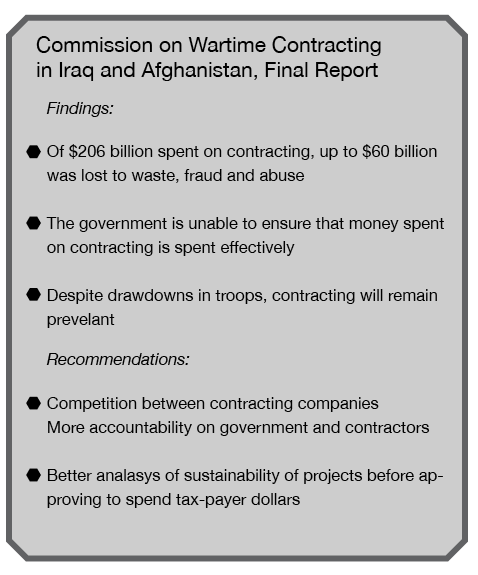 WASHINGTON — Of $206 billion spent on private contracting in Iraq and Afghanistan, up to $60 billion was lost to waste, fraud and abuse, according to a report by a special government commission released this week.
WASHINGTON — Of $206 billion spent on private contracting in Iraq and Afghanistan, up to $60 billion was lost to waste, fraud and abuse, according to a report by a special government commission released this week.
The report — released Wednesday at a hearing of the Senate Subcommittee on Readiness and Management Support, which created the commission — called the need for change in U.S. wartime contracting “urgent.”
In response, Subcommittee Chairwoman Claire McCaskill D-Mo., said at the hearing that she intends to write comprehensive legislation to overhaul wartime contracting processes and oversight.
Speaking on behalf of the Department of Defense, Air Force Lt. Gen. Brooks Bash and Frank Kendall, under secretary of defense, acknowledged to the committee that there have been problems with security contracting in the past, but boasted increased contracting oversight in recent years.
Some projects, including an expensive power plant, have been built but not used because Afghanistan can’t afford to operate them, McCaskill said. “Somebody should’ve said ‘Whoa, time out, we need to stop this,’” she said.
Sen. Kelly Ayotte, R-N.H., was equally adamant on the need for more accountability.
“(Wartime) contracting is the most powerful non-kinetic weapon on the battlefield—especially in a counterinsurgency,” said Sen. Kelly Ayotte, R-N.H. “We must not haphazardly, obliviously or hastily contract.”
The commission argued that accountability needs to include not only the government agencies doing the contracting but extend to the contractors themselves.
Commission member Dov Zakheim told the Senate subcommittee that oversight is not enough and argued for more scrutiny of which projects are pursued.
“Why is DoD into $5 million projects?” he said.
Sen. Joe Manchin, D-W. Va., raised a concern that too much of the contracting money goes to nation-building projects rather than military operations.
“You can imagine the consternation we have, when we’re pouring almost as much into Afghanistan as Afghanistan generates in its own GDP,” he said.
Manchin alsoworried that the military is losing troops to contractors, citing discussions he has had with soldiers in Afghanistan.
“Invariably they told me they intend to cycle out so they can get a better job in private contracting,” he said.
Bash dismissed Manchin’s concerns.
“Retention of forces is really at an all-time high right now,” he said.
While the wars in Iraq and Afghanistan are being drawn down, defense contractors will continue to play a significant role in both places. Meanwhile, with the U.S. involvement in Libya—in addition to unforeseen contingency operations—any poor contracting decisions could weigh heavily on the U.S. economy.
